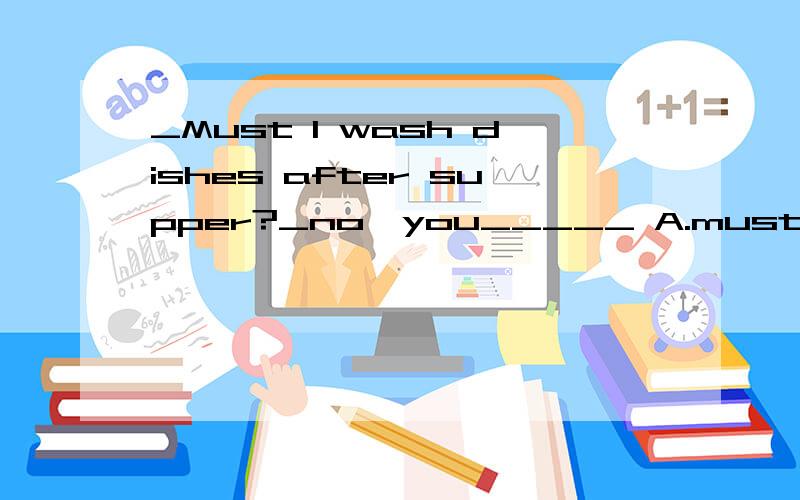_Must I wash dishes after supper?_no,you_____ A.mustn't B.do not have to C.do not D.must 为什么是c顺便说一下,surprised,surprise,surprising的区别和用法,been和gone呢?
来源:学生作业帮助网 编辑:作业帮 时间:2024/04/28 18:09:29

_Must I wash dishes after supper?_no,you_____ A.mustn't B.do not have to C.do not D.must 为什么是c顺便说一下,surprised,surprise,surprising的区别和用法,been和gone呢?
_Must I wash dishes after supper?_no,you_____ A.mustn't B.do not have to C.do not D.must 为什么是c
顺便说一下,surprised,surprise,surprising的区别和用法,been和gone呢?
_Must I wash dishes after supper?_no,you_____ A.mustn't B.do not have to C.do not D.must 为什么是c顺便说一下,surprised,surprise,surprising的区别和用法,been和gone呢?
1,首先这是一个反义疑问句,说的是“我必须么?”答案不能说,“不,你不必须”,只能稍微委婉一点 ,简单说就是“不,不是的”,就完事了
2.A.mustn't 恩,你不必须?这样翻译~没见过,不需强调.B.跟A一样.have to跟must 意思相同,前面加了东西只是因为have to 是个短语,没法像mustn't那样直接否定.C.否定就可以,正确 D.如果是答“是的,你必须洗碗”那就应该是yes...所以这个也是错的 选C
3.surprised 是过去形式,用去过去时和虚拟语气 surprise 做动词V,使用使用,surprising有形容词的意思,还常用于固定搭配(此时为名词n.),比如be动词后面必须接doing格式等等...
C. don’t have to don't have to =needn't 都是:不必的意思。回答时候都采取委婉的语气,must的意思过于绝对和肯定。Amustn't是禁止的意思,must开始的疑问句都不用mustn't回答,而是用不必:即是don‘t have to .肯定回答是yes,you can
C. don’t have to don't have to =needn't 都是:不必的意思。 全可以用于回答must 的问句。 d don't have to C